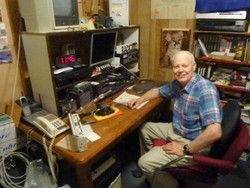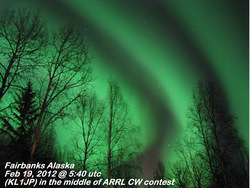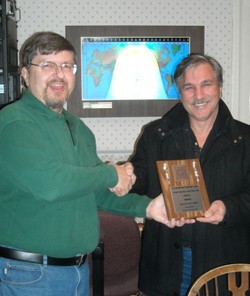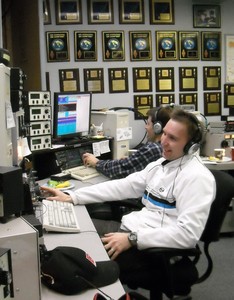 February 29, 2012 Editor: Ward Silver, NØAX | |||||||
IN THIS ISSUE
NEW HF OPERATORS - THINGS TO DO This weekend brings the phone weekend of the venerable ARRL DX Phone contest, now more than 80 years old and the oldest of all radiosport contests. With all the DX beaming your way, fill your log with long-distance contacts and practice your pileup and copying technique. BULLETINS There are no bulletins in this issue BUSTED QSOS Clarifying the WRC-12 report from the last issue - the new allocation will not take effect until it is entered into the Radio Regulations. No date has been set for this, but it is unlikely to be earlier than January 1, 2013. In any case, no amateur can use the band until his or her national regulations are revised to implement the allocation. (Thanks, Khrystyne K1SFA) CONTEST SUMMARY Complete information for all contests follows the Conversation section March 3-4
Mar 10-11
The following schedule of free webinars comes from Potomac Valley Radio Club President K4ZW, Ken Claerbout: Title: N1MM Logger in Depth: Part 1 - Overview The web link to registration is posted on the PVRC website under the Upcoming Webinars link.
The WRC-12 Plenary meeting agreed that WRC-15 will consider a possible new secondary amateur allocation within the band 5250 - 5450 kHz in accordance with Resolution COM6/12 (WRC-12). A worldwide amateur allocation on 60 meters draws ever closer - patience! (Thanks, Frank W3LPL) Also drawing closer is the summer thunderstorm season here in the US. This would be a great time to spend a few hours in a National Weather Service (NWS) SKYWARN training session. Even with the advances in Doppler radar and other monitoring marvels, the NWS relies on the eyes and instruments of observers. Contesters make great weather spotters, too, being accustomed to exchanging information accurately and efficiently. Here's a great way to put your talents to work for your community - especially younger hams looking for a way to make meaningful contributions. Here's an interesting remote rig control interface based on the iPad. It also logs your contacts! (Thanks, Brian K1BRF) Jim AD1C has released version 3.1 of PASS - a program to analyze passing stations from band-to-band during contests. This version includes pass_win.exe which will work from a command prompt under Window 7/Vista as well as Windows XP. There has been a lot of discussion of the Sun's activity and potential effects on terrestrial electronic and power distribution systems. You'd never know it from the current state of the higher HF bands but there were a lot of sunspots just a couple of months ago - and they could return at any time. Not known for alarmist narrative, this IEEE Spectrum article "A Perfect Storm of Planetary Proportions" reviews susceptibility to solar surges. Rick NQ4I notes that the NQ4I multi-multi team has preferred using the cqcontest Russian real-time contest score posting website. There are plenty of features, including display of scores and multipliers.
With interest building in the eventual MW (medium wave) amateur allocation, readers may be interested in the printed monthly magazine called "Lowdown" published by the Longwave Club of America, covering everything on LF from "Natural Radio" (atmospherics) to 500 kHz, experimental stations, technical content, and a stations-heard listing. (Thanks, Bob K2EUH) After a weekend of listening to Reverse Beacon Network spot-clickers all winding up approximately exactly zero-beat with each other on a DX station, here's a good one from Guy N7ZG - "If QNZ means 'please zero beat my frequency' then how about adding QTK, meaning "Will you knuckleheads please spread out?"" Web Site of the Week - Notice just reached the Contest Corral of a brand-new contest from China - the Worked All Provinces of China (WAPC), sponsored by the Mulan DX Club. A "test" run will be held on 21 April from 0000-2359Z and the main event is currently planned for October 6th. It is great to see a Chinese-sponsored HF DX contest! (Thanks, Randy K5ZD and Fred K3ZO) WORD TO THE WISE Pass - In a multi-operator station, it's a good idea to keep your eye on the logging software to notice if the station you are working is needed on another band for a multiplier. If so, ask them if they will move for you - it's called "passing the multiplier" and a well-executed sequence of ringing up a few new ones, particularly late in the contest, is really exciting to see! During the 2011 CQWW CW there were good conditions on the 15 meter band and Julian VK4CMV recorded signals with extreme echoes from SK3W - near his antipode. In this YouTube video you can hear strong echoes that are delayed almost a half second. While not quite as much time elapsed as for Long Delayed Echoes, this is clearly unusual propagation. (Thanks, Ingo SM5AJV)
The solar wind stream that hit Earth's magnetic field on Feb. 18th initiated surprisingly widespread aurora displays. Sightings of the aurora borealis crossed the Canadian border and were reported as far south as Nebraska in the United States. Photographs of the display and speculation about what made the solar wind impact so potent are available on the Spaceweather website. While you're there, read up on the planetary conjunctions going on now and in the days to come. Zoli HA1AG posted a nice photo album from the ED9M operation last year. While you're there, check out his photos from other radio adventures! Did you ever wonder how long a nanosecond is? Watch this video as Admiral Grace Hopper (SK) explains. RTTY contesting is certainly growing like a weed. Ed WØYK, CQ RTTY Contest Director informs us that, "Over 3300 logs have been received, topping last year's record number of 2374. However, there are many more call in the aggregate QSOs from the received logs, so there are many more logs available to aid the log checking. We would appreciate receiving your log even if you'd like it to be used as a checklog. No log is too small to be useful!" The log submission deadline is 2359Z on Thursday, Mar 1 and logs can be submitted by email or via the web. Preliminary CW Sprint Results can be found on the National Contest Journal website. Congratulations to Scott KA9FOX with a very impressive QRP score over 10K points. There was a photo finish in the team scores with NCCC #1 just edging out the Ad Hoc team. (Thanks, CW Sprint Manager, Tree N6TR)
Check out the soapbox comments collected from 3830 postings for recent contests by Dink N7WA. Great reading and an excellent way to get prepared for the next contest! Who was loudest? Who was spotted the most on all the bands? Pete N4ZR reports that Bob N6TV has prepared a package of statistics from the recent ARRL DX CW contest. They are now posted on the Reverse Beacon Network blog. Everyone who submitted a log for the WPX SSB/CW Contests was sent an email with a link to their log checking report. If you lost that email or did not receive it you should contact WPX Contest Director, Randy K5ZD. A list of Logs Received for the 2011 edition of the Canada Winter Contest has been published. Inquiries on the listing can be sent to Canada Winter Contest Chairman, Sam VE5SF. Plaques for the 2010 edition of the Canada Winter Contest are in the mail - don't forget to drop a note of thanks to the plaque sponsor! Results for the Stew Perry contest are "basically final." Contest manager, Tree N6TR of the Boring (OR) Amateur Radio Club says, "At some point, I will figure out who won which awards and do a writeup. That is - unless someone is inspired to do a guest writeup like Paul, K8PO did last year. It was nice seeing the writeup done from a less "Boring" perspective for a change." Contest Director, Goetz DJ3IW and Contest Manager, Bernd DC4HB write to let us know that the results of the 2011 DRCG Long Distance Contest are available. OPERATING TIP When conditions are "funny" due to a solar hiccup or a geomagnetic disturbance, start looking for unusual propagation along skewed paths or for openings at unusual times. Paths at the customary times and bearings may be closed but when the ionosphere is busy, strange things have been known to happen! Brian K1LI writes, "In the category of "useful resources," I find that the Space Weather Alerts and Warnings Timeline gives me, at a glance, lots of information that helps me understand what's going on propagation-wise, such as the timeline for Jan 16 -31. It gives a very interesting depiction of the events we all witnessed.." When using the paralleled-coax technique of making balanced transmission line from coax, does that change the velocity factor? "Nope...it's exactly the same." What about the matched loss of the line? "The matched loss per unit length of the resulting twin-lead will also be exactly the same." (Thanks, Jim W6RMK and Steve G3TXQ) You can run tetrode amplifier tubes as grounded-grid as described in this classic article by Bill Orr W6SAI in which he describes such operation of the 4-125A, 4-250A, 4-400A, and 4-1000A. (Thanks, Bill WA4LAV) John KE7KDQ recently compiled this list of Do-It-Yourself (DIY) electronic and circuit-building apps for the Android operating system. And while we're in DIY mode, here's an Instructables lesson on the how-to of motors. What do motors have to do with radio? Ask any SteppIR antenna owner!
Technical Web Site of the Week - The Bliley crystal pictured in the previous issue prompted this recollection by Ellen W1YL of the famous VF1 "variable frequency" (or "rubber") crystals. "Yes it was intentionally designed to allow you to change frequency-- as I seem to recall (over 60 years ago now!) it had a variable pressure plate with a exterior portion that you 'screwed' in or out to vary the frequency...just a bit but it was literally our first VFO and a big deal, even though the frequency variation was small." You can see the Bliley VF1 on the website maintained by Bliley descendent, Charles K3NAU. Recordum Quod est Locutus The Latin phrase for "record what is spoken" should be kept in mind during this weekend's coming ARRL DX Phone contest - and throughout the year. Your job - as a radio operator - is to record the information that is actually transmitted by the other station, beginning with the call sign. Believe not the spot - verily, I say unto you, verify! Listen so that you are sure of what you put in your log. If a station is not giving a call sign frequently enough, call and ask for it. Exhibit a healthy amount of skepticism towards the information popping up on your band map or web browser. Using any of the contest modes, the slightest miscue will result in a busted call or exchange and cost you the contact, possibly the multiplier, and probably some penalty points.
Really? A rare station that just happens to have a call sign just one letter different from a station that has been spotted ad infinitum all weekend just happens to show up on Sunday afternoon? Really? Really? Down on the low bands, you just worked a distant multiplier with an incredibly booming signal who was spotted only a couple hundred hertz from a much closer station? Really? Before you jump all over that instant pileup and hit the send button - stop and think about what might actually be happening. You're probably going to cost yourself major points by not listening and thinking. Really! On the other side of the equation, when you spot a station manually be sure you are giving out the right information. On CW, it's so easy to miss a dit, changing a 4 to a V or a 6 to a B. On phone, the accents and QRM make for a double accuracy whammy. Was that a B or a P? An M or an N? Phonetically, please! Maybe a catchier latin-inspired phrase would be effingo quod propagtur - copy what propagates? Could we start a radiosport movement? Sure, it's fun to click spots and watch your multiplier totals rocket their way up the ladder, but take a little extra time to be sure you've effingo-ed correctly and completely. With so much information flying around cyberspace, it's easy to forget the purpose of contesting in the first place which is to develop operating skill. Don't substitute logging information off the 'net rather than what you copy off the air. 29 February through 13 March An expanded, downloadable version of QST's Contest Corral in PDF format is available. Check the sponsor's Web site for information on operating time restrictions and other instructions. HF CONTESTS ARRL Int'l Phone DX Contest--Phone, from Mar 3, 0000Z to Mar 4, 2400Z. Bands (MHz): 1.8-28. Exchange: RS and state, province, or power. Logs due: Apr 3. Rules OK1WC Memorial Contest--Phone,CW, from Mar 5, 1600Z to Mar 5, 1659Z. Bands (MHz): 3.5, 50. First through fourth Monday of each month; see website. Exchange: RS(T) and serial. Logs due: 14 days. Rules SNS and NS Weekly Sprints--CW, from Mar 2, 0200Z to Mar 2, 0300Z. Bands (MHz): 1.8-14. Frequencies: Weekly on Thursday evenings local time. Exchange: Serial, name, and S/P/C. Logs due: 2 days. Rules Open Ukraine RTTY Championship--Digital, from Mar 3, 2000Z to Mar 3, 2359Z and Mar 4, 0800Z to Mar 4, 1159Z. Multiple operating periods. Bands (MHz): 1.8-28. Exchange: Regional abbreviation and serial. Logs due: Apr 4. Rules ARS Spartan Sprint--CW, from Mar 6, 0200Z to Mar 6, 0400Z. Bands (MHz): 3.5-28. Frequencies: Monthly on the first Monday evening local time. Exchange: RST, S/P/C, and power. Logs due: 2 days. Rules YL CW Party--CW, from Mar 6, 1900Z to Mar 6, 2100Z. Bands (MHz): 3.5. Exchange: RST, serial, if YL "YL," name. Logs due: Mar 31. Rules John Rollins Memorial DX Contest--CW, from Mar 7, 2300Z to Mar 8, 2300Z and Mar 10, 2300Z to Mar 11, 2300Z. Multiple operating periods. Bands (MHz): 7,14. Exchange: RS, name, and S/P/C. Logs due: 4 weeks. Rules RSGB Commonwealth Contest--CW, from Mar 10, 1000Z to Mar 11, 1000Z. Bands (MHz): 3.5-28. Exchange: RST and serial (Commonwealth only). Logs due: 30 days. Rules AGCW QRP Contest--CW, from Mar 10, 1400Z to Mar 10, 2000Z. Bands (MHz): 3.5-28. Exchange: RST, serial, class, AGCW number or NM. Logs due: Mar 31. Rules QRP ARCI HF Grid Square Sprint--CW, from Mar 10, 1500Z to Mar 10, 1800Z. Bands (MHz): 3.5-28. Frequencies: QRP calling frequencies. Exchange: RST, 4-digit grid square, QRP ARCI number. Logs due: 14 days. Rules EA PSK63 Contest--Digital, from Mar 10, 1600Z to Mar 11, 1600Z. Bands (MHz): 3.5-28. Exchange: RST + serial or EA province. Logs due: 30 days. Rules Idaho QSO Party--Phone,CW,Digital, from Mar 10, 1900Z to Mar 11, 1900Z. Bands (MHz): 1.8-28, 50-440, Frequencies: CW 35 kHz above band edge; Phone 7.260, 14.260, 21.335, 28.470 MHz, plus 50, 144, 440 . Exchange: RS(T) and ID county or S/P/C. Logs due: 30 days. Rules North American RTTY Sprint--Digital, from Mar 11, 0000Z to Mar 11, 0400Z. Bands (MHz): 3.5-14. Exchange: Both call signs, serial, name, and S/P/C. Logs due: 7 days. Rules Wisconsin QSO Party--Phone,CW,Digital, from Mar 11, 1800Z to Mar 12, 0100Z. Bands (MHz): 3.5-28, 50+, Frequencies: CW 3.550, 7.050, 14.050; Phone 3.890, 7.230, 14.290, 21.350, 28.400. Exchange: WI county or S/P/C. Logs due: Apr 12. Rules VHF+ CONTESTS OK1WC Memorial Contest--Phone,CW, from Mar 5, 1600Z to Mar 5, 1659Z. Bands (MHz): 3.5, 50. First through fourth Monday of each month; see website. Exchange: RS(T) and serial. Logs due: 14 days. Rules Worldwide EME Contest--Phone,CW, from Mar 3, 0000Z to Mar 4, 2400Z. Bands (MHz): 432, 3.4 GHz. Exchange: TMO/RS(T) and "R". Logs due: Jun 25. Rules Idaho QSO Party--Phone,CW,Digital, from Mar 10, 1900Z to Mar 11, 1900Z. Bands (MHz): 1.8-28, 50-440, Frequencies: CW 35 kHz above band edge; Phone 7.260, 14.260, 21.335, 28.470 MHz, plus 50, 144, 440 . Exchange: RS(T) and ID county or S/P/C. Logs due: 30 days. Rules Wisconsin QSO Party--Phone,CW,Digital, from Mar 11, 1800Z to Mar 12, 0100Z. Bands (MHz): 3.5-28, 50+, Frequencies: CW 3.550, 7.050, 14.050; Phone 3.890, 7.230, 14.290, 21.350, 28.400. Exchange: WI county or S/P/C. Logs due: Apr 12. Rules LOG DUE DATES 29 February through 13 March February 29 - SPAR Winter Field Day March 1 - BARTG RTTY Sprint March 1 - AWA Linc Cundall Memorial CW Contest March 1 - CQ WW RTTY WPX Contest March 1 - RSGB 80m Club Championship, CW March 4 - SARL Digital Contest March 5 - FYBO Winter QRP Sprint March 5 - Vermont QSO Party March 6 - EPC WW DX Contest March 6 - Delaware QSO Party March 6 - Black Sea Cup International March 6 - Mexico RTTY International Contest March 6 - Russian PSK WW Contest March 10 - North American QSO Party, RTTY March 11 - KCJ Topband Contest March 12 - Dutch PACC Contest March 12 - FISTS Winter Sprint March 12 - YLRL YL-OM Contest ARRL Information Click here to advertise in this newsletter. Your One-Stop Resource for Amateur Radio News and Information ARRL membership includes QST, Amateur Radio's most popular and informative journal, delivered to your mailbox each month. Subscribe to NCJ - the National Contest Journal. Published bimonthly, features articles by top contesters, letters, hints, statistics, scores, NA Sprint and QSO Parties. Subscribe to QEX - A Forum for Communications Experimenters. Published bimonthly, features technical articles, construction projects, columns and other items of interest to radio amateurs and communications professionals. Free of charge to ARRL members: Subscribe to The ARRL Letter (weekly digest of news and information), the ARES E-Letter (monthly public service and emergency communications news), Division and Section news -- and much more! ARRL offers a wide array of products to enhance your enjoyment of Amateur Radio. Visit the site often for new publications, specials and sales. Donate to the fund of your choice -- support programs not funded by member dues! Reprint permission can be obtained by sending email to permission@arrl.org with a description of the material and the reprint publication. ACKNOWLEDGEMENTS ARRL Contest Update wishes to acknowledge information from WA7BNM's Contest Calendar and SM3CER's Contest Calendar. | |||||||












